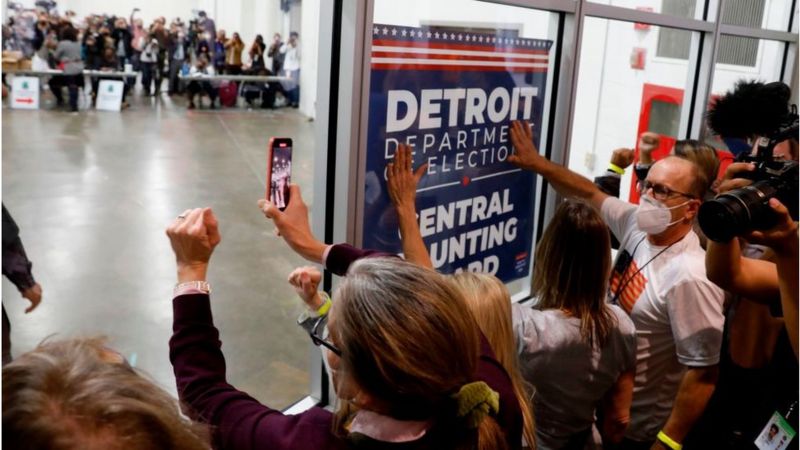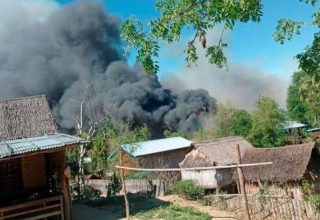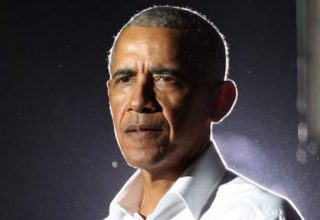
Democrat Joe Biden has been declared president-elect, but President Donald Trump is challenging the result, alleging electoral fraud.
US election officials have said the 2020 election was the “most secure in American history”.
However, the Trump campaign – yet to provide any strong evidence of fraud – is continuing to pursue lawsuits in several key states.
Here’s what we know so far.

Pennsylvania
Mr Biden is projected to have won here.
On 4 November, the Trump campaign filed a lawsuit alleging a lack of access for poll watchers in the state.
Poll watchers are people who observe the counting of votes, with the aim of ensuring transparency. They are allowed in most states as long as they are registered before election day.

In some areas this year, restrictions were put in place before election day, in part due to coronavirus. There were also capacity limits to avoid intimidation.
A 20-foot (six-metre) perimeter was set in the Philadelphia counting facility but this was challenged, and a court ruling on 5 November said it should be reduced to six feet – as long as poll watchers stuck to Covid-19 rules.
On the same day, the Trump campaign accused election officials of violating the judge’s order, and filed a federal lawsuit to stop the count in Philadelphia, which was rejected.
In an ongoing lawsuit filed on 9 November, the Trump campaign is seeking to block the certification of the results in Pennsylvania, alleging unfair levels of oversight between Democratic and Republican-leaning counties.
Another challenge centres on the state’s decision to count ballots that were postmarked by election day, but arrived up to three days later.
Republicans appealed this, saying that all postal ballots received after election day should be disqualified. On 12 November, the US Court of Appeals rejected the case, but the Supreme Court could still hear the Republicans’ appeal.
Pennsylvania state officials estimate that about 10,000 ballots were received in the three days after election day. They say these ballots are being kept on one side, in the light of on-going legal challenges.
Counting of other votes is continuing, with the election tally on 16 November showing Mr Biden almost 70,000 votes ahead of President Trump.
On 13 November, courts rejected a string of challenges by the Trump campaign based on almost 9,000 postal ballots they said lacked information, such as the date the ballot was cast or the voter’s address.
The Trump campaign has had a small victory over how long voters should be given to provide proof of identification if it was missing or unclear on their postal ballots. The deadline was by 12 November, but this has been reduced by three days.

Michigan
Mr Trump won the state in 2016 by his slimmest margin – just over 10,700 votes – and Mr Biden is projected as the winner here in 2020.
On 4 November, the Trump campaign filed a lawsuit to stop the count over claims of a lack of access to observe the process.
A judge dismissed the lawsuit, saying there was insufficient evidence that oversight procedures weren’t being followed.

Another lawsuit was filed on 9 November in Michigan, seeking to block the certification of results in Wayne County, citing further complaints from poll watchers. This was rejected on 13 November.
On 11 November, the Trump campaign filed a lawsuit which largely repeats the claims made above.
This is a federal suit, but the similar challenge was rejected in a Michigan court, so experts say it’s unlikely to succeed.

Nevada
The Nevada Republican Party tweeted saying: “Thousands of individuals have been identified who appear to have violated the law by casting ballots after they moved from Nevada.”
A letter sent to US Attorney General William Barr on 5 November alleged more than 3,000 ballots were “improperly cast”, and the president’s legal team produced a list of people it claimed had moved out of state but voted.
But many of them ended up being be legal voters who were soldiers and their spouses stationed elsewhere.
Military personnel, as well as students, from Nevada – living elsewhere – can still vote. People who leave the state within 30 days before an election can also vote.
In a separate case filed on 5 November, Republicans tried to stop the use of a signature verification machine at the count – but their attempt was blocked by a federal judge.

Georgia
A lawsuit was filed in Georgia’s Chatham County to pause the count on 4 November, alleging problems with ballot processing.
Georgia Republican chairman David Shafer tweeted that party observers saw a woman “mix over 50 ballots into the stack of uncounted absentee ballots”.
On 5 November, a judge dismissed this lawsuit, saying there was “no evidence” of improper ballot mixing.

Arizona
The Trump campaign filed a lawsuit in Arizona on 7 November, claiming some legal votes were rejected.
The case cites declarations by some poll watchers and two voters who claim they had problems with voting machines.
But Arizona’s Secretary of State said this was “grasping at straws”, and on 13 November Trump’s team dropped the suit.


Could it reach the Supreme Court?
On 4 November, Mr Trump claimed voting fraud – without providing evidence – and said: “We’ll be going to the US Supreme Court”.
If the election result is challenged, it would usually first require legal teams to challenge it in the state courts – but the US attorney general has allowed federal prosecutors to probe the allegations.
State judges would then need to uphold the challenge and order a recount.
The Supreme Court could then be asked be asked to weigh in.

Prof Briffault says: “There’s no standard process for bringing election disputes to the Supreme Court. It’s very unusual and it would have to involve a very significant issue.”
To date, the 2000 election is the only one to be decided by the US Supreme Court.
In 2000, Democrat Al Gore lost Florida – and the presidential election – by 537 votes out of a total of almost six million cast in the state.
This was followed by a highly controversial recount process that lasted over a month – until the Supreme Court ruled to stop recounting and in favour of Republican George W Bush who became president.
Additional reporting by Ritu Prasad

Source: BBC




















